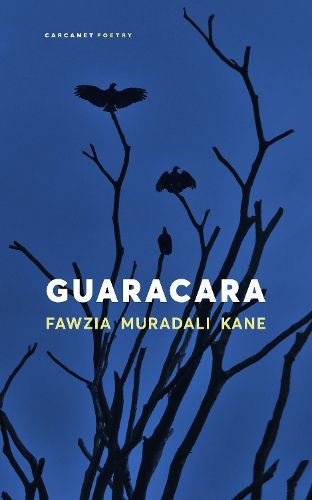Readings Newsletter
Become a Readings Member to make your shopping experience even easier.
Sign in or sign up for free!
You’re not far away from qualifying for FREE standard shipping within Australia
You’ve qualified for FREE standard shipping within Australia
The cart is loading…






This book traces the poet's ancestral Indo-Caribbean legacy, following the history of the cane sugar industry, and growing up in an oil refinery small town in south Trinidad.
The 'Guaracara' opening section contains snapshot recollections of a childhood that witnessed the effect and damage caused by the refinery to land and workers. These memories of loss of people and place are woven into reflections as an adult who has moved to a new life, thousands of miles away, across the Atlantic.
The central long sequence 'Let us mourn the death of King Sugar', written in Trini Creole - the poet's first language - consists of 13 Stations/poems where King Sugar charms then admonishes, and at times mocks, then falsely comforts canefield workers over three centuries.
The Stations shadow the profane arc of the cane sugar industry's brutality of enslavement, through to indentureship's deceitful transportation, to end with a sudden shut-down in Trinidad & Tobago due to political and commercial reasons.
The final sequence 'Ancestral Coda' links the poet's family oral histories passed down through the generations, intertwined with her own experience as witness to family rituals of more recent bereavements.
$9.00 standard shipping within Australia
FREE standard shipping within Australia for orders over $100.00
Express & International shipping calculated at checkout
Stock availability can be subject to change without notice. We recommend calling the shop or contacting our online team to check availability of low stock items. Please see our Shopping Online page for more details.
This book traces the poet's ancestral Indo-Caribbean legacy, following the history of the cane sugar industry, and growing up in an oil refinery small town in south Trinidad.
The 'Guaracara' opening section contains snapshot recollections of a childhood that witnessed the effect and damage caused by the refinery to land and workers. These memories of loss of people and place are woven into reflections as an adult who has moved to a new life, thousands of miles away, across the Atlantic.
The central long sequence 'Let us mourn the death of King Sugar', written in Trini Creole - the poet's first language - consists of 13 Stations/poems where King Sugar charms then admonishes, and at times mocks, then falsely comforts canefield workers over three centuries.
The Stations shadow the profane arc of the cane sugar industry's brutality of enslavement, through to indentureship's deceitful transportation, to end with a sudden shut-down in Trinidad & Tobago due to political and commercial reasons.
The final sequence 'Ancestral Coda' links the poet's family oral histories passed down through the generations, intertwined with her own experience as witness to family rituals of more recent bereavements.